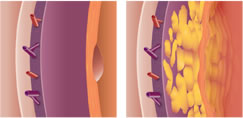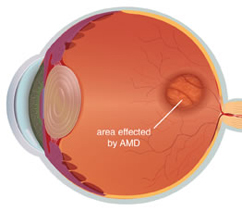

Macular Degeneration
The macula is a small area in the middle of the retina. The retina, at the back of the eye, is a fragile tissue, which converts the light, entered into the eye through the pupil, into images, and sends them to the brain.
The macula is very important, it controls our central vision and allows us to see fine detail for activities such as reading and writing, as well as our ability to see colour.
What is macular degeneration?
Macular degeneration is the most common cause of sight loss in people aged 60 and over. It occurs when the macular becomes damaged. The macular is visually the most sensitive part of the retina and is responsible for our very acute central vision. Almost everyone with macular degeneration can be reassured that they should retain enough peripheral vision to remain mobile. Macular degeneration is not painful and will never lead to total loss of sight. If Macular Degeneration occurs later in life, it is called “age-related macular degeneration”, also often known as AMD.
What are the symptoms?
Initial stages of macular degeneration can result in your central vision being blurred or distorted, objects may look unusual in size or shape and straight lines become wavy or fuzzy. You may be very sensitive to light or see lights, shapes and colours that are not there. People with an advanced condition may often see a blank patch or dark spot in the centre of their vision. Reading, writing and recognising small objects or faces can become very difficult.
Symptoms may happen quickly or develop over several months and may cause occasional discomfort, but AMD is not painful.
Types of macular degeneration:
There are two types of macular degeneration or AMD, often referred to as “wet” and “dry”. This is not the way the eye feels, it is what the optician sees when looking at the macula.
* Ninety percent of people with AMD have "dry macular degeneration", which currently cannot be treated, however, aids such as magnifiers can help with reading and other tasks.
* Ten percent of people with AMD have "wet macular degeneration", for which there are a number of new treatments available.
Both “wet” and “dry” AMD usually involve both eyes, although one may be affected long before the other. This can make the condition difficult to notice.
What should I do if I think I have macular degeneration?
If you think that you may have Macular Degeneration but have no sudden symptoms, you should book an appointment with your optometrist. If there is an accelerated change in your vision, you should consult your doctor or hospital’s Accident and Emergency department straight away.
If you have AMD in one eye, and you start getting symptoms in your other eye, then you should go to your hospital or ask your GP to arrange an emergency appointment.
What does an eye examination involve?
The optician will assess the vision in both eyes, you may be given eye drops to enlarge your pupil enabling the optician to look into your eye. The drops take about 30 minutes to work but the effect may last for several hours. Your vision will become blurred for a while and your eyes may become sensitive to light, this is a normal reaction to the drops and nothing to worry about. Due to the symptoms of AMD you may not meet the visual requirements for driving, it is recommended that you do not drive to the hospital for this examination. You may also find it would be helpful if someone is with you to help you home.
Your optician can assess the level of macular degeneration and give you all the professional advice and care that you need.
People with macular degeneration can be given advice to help them use their remaining vision as fully as possible. Advice on lighting, contrast and low vision aids, such as magnifier's or stronger glasses will assist with this.
Regular eye tests by an optician will help to monitor any changes that might occur due to macular degeneration. To book an appointment in your home with one of our domiciliary opticians, call us on our freephone number 0800 85 44 77
Eye Health
- Why Sight Tests Are Important
- Glaucoma
- Cataracts
- Macular Degeneration
- Diabetic Retinopathy
- Low Vision Aids
- Spectacles
- Suitable Frames
- Smoking
- Nutrition
(coming soon)


